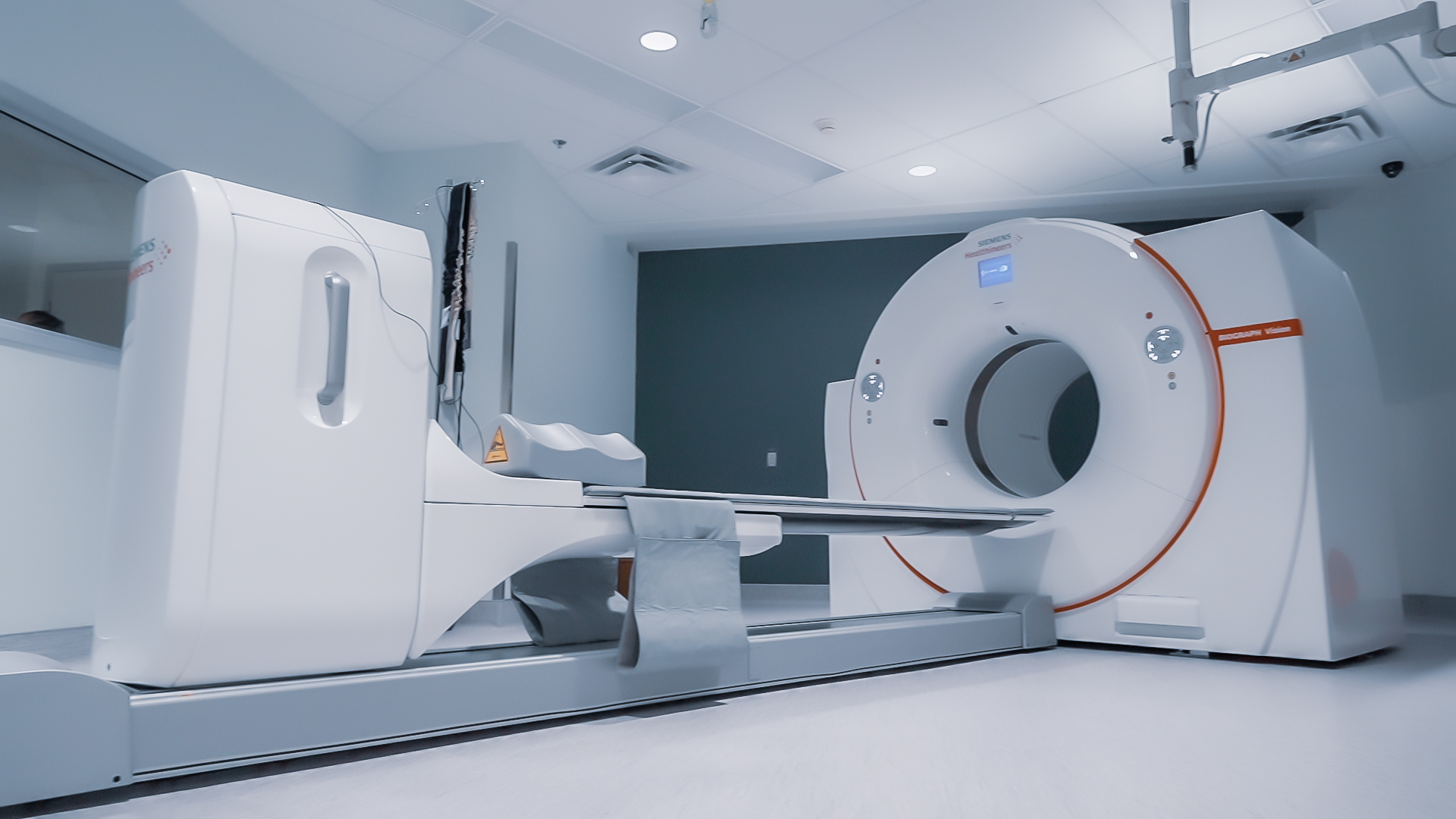

Visualizing New Pathways in Diagnostics, Treatment and Research
The Royal Alexandra Hospital is home to one of the highest resolution digital PET/CT systems in the country, paving the way for important discoveries and research that results in more accurate treatment for some patients. Donors brought the PET/CT scanner to the hospital through a $3.5 million fundraising campaign coordinated by the Royal Alexandra Hospital Foundation.
The PET/CT (Positron Emission Tomography and Computed Tomography) scanner captures images of the body’s function at the molecular level, providing physicians with information that other imaging technologies cannot provide. Doctors can identify disease in its earliest stages and determine its exact location. Often this means they can find potentially life-threatening issues before symptoms occur or abnormalities can be detected with other diagnostic tests.
The technology could prove instrumental in cancer studies, such as one led by Dr. Adam Kinnaird. He and a team of researchers have been comparing the accuracy of the PET/CT in detecting prostate cancer versus what is currently considered the gold standard of testing, the prostate MRI (magnetic resonance imaging). Dr. Kinnaird’s trial centers around a locally produced experimental tracer that can be injected into a patient’s bloodstream where it binds to prostate cancer cells so they are visible on a PET scan.
“Before a man gets his prostate out, we do both scans on him and see which was more accurate once the prostate is removed,” explained Dr. Kinnard during a recent public health lecture. The findings could be practice-changing.
“Emerging technologies will fundamentally change how we diagnose and treat prostate cancers. These leading-edge trials are possible because of philanthropic partners like the Royal Alexandra Hospital Foundation.”
Dr. Kinnaird currently holds the Frank and Carla Sojonky Chair in Prostate Cancer Research at the University of Alberta, an endowed position made possible thanks to a partnership between the Royal Alexandra Hospital Foundation and University Hospital Foundation.
The PET/CT scanner located at the Royal Alexandra Hospital has significantly improved total provincial PET/CT capacity, boasting a capacity increase of 30 per cent (as compared to 2018-2019). Together, the Royal Alexandra Hospital Foundation and generous donors–and medical minds like Dr. Kinnaird–are impacting the trajectory of care and saving lives.
The Royal Alexandra Hospital is home to one of the highest resolution digital PET/CT systems in the country, paving the way for important discoveries and research that results in more accurate treatment for some patients. Donors brought the PET/CT scanner to the hospital through a $3.5 million fundraising campaign coordinated by the Royal Alexandra Hospital Foundation.
The PET/CT (Positron Emission Tomography and Computed Tomography) scanner captures images of the body’s function at the molecular level, providing physicians with information that other imaging technologies cannot provide. Doctors can identify disease in its earliest stages and determine its exact location. Often this means they can find potentially life-threatening issues before symptoms occur or abnormalities can be detected with other diagnostic tests.
The technology could prove instrumental in cancer studies, such as one led by Dr. Adam Kinnaird. He and a team of researchers have been comparing the accuracy of the PET/CT in detecting prostate cancer versus what is currently considered the gold standard of testing, the prostate MRI (magnetic resonance imaging). Dr. Kinnaird’s trial centers around a locally produced experimental tracer that can be injected into a patient’s bloodstream where it binds to prostate cancer cells so they are visible on a PET scan.

“Before a man gets his prostate out, we do both scans on him and see which was more accurate once the prostate is removed,” explained Dr. Kinnard during a recent public health lecture. The findings could be practice-changing.
“Emerging technologies will fundamentally change how we diagnose and treat prostate cancers. These leading-edge trials are possible because of philanthropic partners like the Royal Alexandra Hospital Foundation.”
Dr. Kinnaird currently holds the Frank and Carla Sojonky Chair in Prostate Cancer Research at the University of Alberta, an endowed position made possible thanks to a partnership between the Royal Alexandra Hospital Foundation and University Hospital Foundation.
The PET/CT scanner located at the Royal Alexandra Hospital has significantly improved total provincial PET/CT capacity, boasting a capacity increase of 30 per cent (as compared to 2018-2019). Together, the Royal Alexandra Hospital Foundation and generous donors–and medical minds like Dr. Kinnaird–are impacting the trajectory of care and saving lives.
Since the PET/CT Scanner becameoperational in February 2021
Since the PET/CT Scanner becameoperational inFebruary 2021

Visualizing New Pathways in Diagnostics, Treatment and Research
The Royal Alexandra Hospital is home to one of the highest resolution digital PET/CT systems in the country, paving the way for important discoveries and research that results in more accurate treatment for some patients. Donors brought the PET/CT scanner to the hospital through a $3.5 million fundraising campaign coordinated by the Royal Alexandra Hospital Foundation.
The PET/CT (Positron Emission Tomography and Computed Tomography) scanner captures images of the body’s function at the molecular level, providing physicians with information that other imaging technologies cannot provide. Doctors can identify disease in its earliest stages and determine its exact location. Often this means they can find potentially life-threatening issues before symptoms occur or abnormalities can be detected with other diagnostic tests.
The technology could prove instrumental in cancer studies, such as one led by Dr. Adam Kinnaird. He and a team of researchers have been comparing the accuracy of the PET/CT in detecting prostate cancer versus what is currently considered the gold standard of testing, the prostate MRI (magnetic resonance imaging). Dr. Kinnaird’s trial centers around a locally produced experimental tracer that can be injected into a patient’s bloodstream where it binds to prostate cancer cells so they are visible on a PET scan.
“Before a man gets his prostate out, we do both scans on him and see which was more accurate once the prostate is removed,” explained Dr. Kinnard during a recent public health lecture. The findings could be practice-changing.
“Emerging technologies will fundamentally change how we diagnose and treat prostate cancers. These leading-edge trials are possible because of philanthropic partners like the Royal Alexandra Hospital Foundation.”
Dr. Kinnaird currently holds the Frank and Carla Sojonky Chair in Prostate Cancer Research at the University of Alberta, an endowed position made possible thanks to a partnership between the Royal Alexandra Hospital Foundation and University Hospital Foundation.
The PET/CT scanner located at the Royal Alexandra Hospital has significantly improved total provincial PET/CT capacity, boasting a capacity increase of 30 per cent (as compared to 2018-2019). Together, the Royal Alexandra Hospital Foundation and generous donors–and medical minds like Dr. Kinnaird–are impacting the trajectory of care and saving lives.